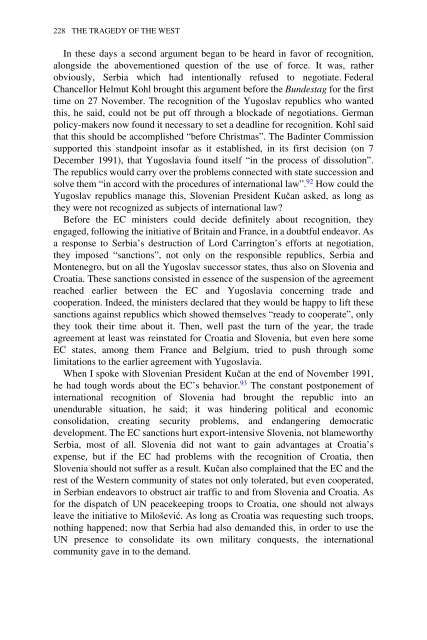Yugoslavia: A History of its Demise - Indymedia
Yugoslavia: A History of its Demise - Indymedia
Yugoslavia: A History of its Demise - Indymedia
You also want an ePaper? Increase the reach of your titles
YUMPU automatically turns print PDFs into web optimized ePapers that Google loves.
228 THE TRAGEDY OF THE WEST<br />
In these days a second argument began to be heard in favor <strong>of</strong> recognition,<br />
alongside the abovementioned question <strong>of</strong> the use <strong>of</strong> force. It was, rather<br />
obviously, Serbia which had intentionally refused to negotiate. Federal<br />
Chancellor Helmut Kohl brought this argument before the Bundestag for the first<br />
time on 27 November. The recognition <strong>of</strong> the Yugoslav republics who wanted<br />
this, he said, could not be put <strong>of</strong>f through a blockade <strong>of</strong> negotiations. German<br />
policy-makers now found it necessary to set a deadline for recognition. Kohl said<br />
that this should be accomplished “before Christmas”. The Badinter Commission<br />
supported this standpoint ins<strong>of</strong>ar as it established, in <strong>its</strong> first decision (on 7<br />
December 1991), that <strong>Yugoslavia</strong> found <strong>its</strong>elf “in the process <strong>of</strong> dissolution”.<br />
The republics would carry over the problems connected with state succession and<br />
solve them “in accord with the procedures <strong>of</strong> international law”. 92 How could the<br />
Yugoslav republics manage this, Slovenian President Kučan asked, as long as<br />
they were not recognized as subjects <strong>of</strong> international law<br />
Before the EC ministers could decide definitely about recognition, they<br />
engaged, following the initiative <strong>of</strong> Britain and France, in a doubtful endeavor. As<br />
a response to Serbia’s destruction <strong>of</strong> Lord Carrington’s efforts at negotiation,<br />
they imposed “sanctions”, not only on the responsible republics, Serbia and<br />
Montenegro, but on all the Yugoslav successor states, thus also on Slovenia and<br />
Croatia. These sanctions consisted in essence <strong>of</strong> the suspension <strong>of</strong> the agreement<br />
reached earlier between the EC and <strong>Yugoslavia</strong> concerning trade and<br />
cooperation. Indeed, the ministers declared that they would be happy to lift these<br />
sanctions against republics which showed themselves “ready to cooperate”, only<br />
they took their time about it. Then, well past the turn <strong>of</strong> the year, the trade<br />
agreement at least was reinstated for Croatia and Slovenia, but even here some<br />
EC states, among them France and Belgium, tried to push through some<br />
limitations to the earlier agreement with <strong>Yugoslavia</strong>.<br />
When I spoke with Slovenian President Kučan at the end <strong>of</strong> November 1991,<br />
he had tough words about the EC’s behavior. 93 The constant postponement <strong>of</strong><br />
international recognition <strong>of</strong> Slovenia had brought the republic into an<br />
unendurable situation, he said; it was hindering political and economic<br />
consolidation, creating security problems, and endangering democratic<br />
development. The EC sanctions hurt export-intensive Slovenia, not blameworthy<br />
Serbia, most <strong>of</strong> all. Slovenia did not want to gain advantages at Croatia’s<br />
expense, but if the EC had problems with the recognition <strong>of</strong> Croatia, then<br />
Slovenia should not suffer as a result. Kučan also complained that the EC and the<br />
rest <strong>of</strong> the Western community <strong>of</strong> states not only tolerated, but even cooperated,<br />
in Serbian endeavors to obstruct air traffic to and from Slovenia and Croatia. As<br />
for the dispatch <strong>of</strong> UN peacekeeping troops to Croatia, one should not always<br />
leave the initiative to Milošević. As long as Croatia was requesting such troops,<br />
nothing happened; now that Serbia had also demanded this, in order to use the<br />
UN presence to consolidate <strong>its</strong> own military conquests, the international<br />
community gave in to the demand.
















